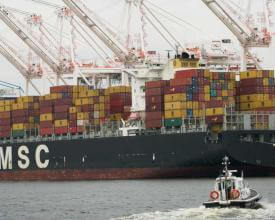DHA eNews – Trump Announces Reciprocal Tariffs
DHA continues to advocate for fair trade in decorative hardwood products. The current administration is providing good opportunities for us to make our case and some unfortunate challenges for our Canadian trade. This week, we filed comments on how imports of wood products affect national security, highlighting the massive negative impact that unfair trade practices—particularly from China and other countries in Asia—have had on our members and our industry. In addition, we argued for a ban on imports of Russian wood products shipped from any country that distorts global trade in wood products.
Make your voice heard: join me and our members' leadership teams at the DHA Annual Meeting, May 13-15, in San Antonio, Texas. Experts will update us on a wide range of subjects that will affect our industry. This year is a critical time for our industry and we want your input on DHA's priorities and initiatives.
If you have questions or comments, contact me. I look forward to hearing from you.

Keith A. Christman, President

President Trump directed the U.S. Department of Commerce to investigate how imports of wood products affect national security. DHA provided expert insights, highlighting the negative impact of unfair trade practices from China and other countries in Asia on our members and how unfair trade practices weaken our industry. DHA also wrote about how illegally and unsustainably harvested Russian wood has infiltrated the global supply chain and argued for a ban on Russian wood products imported from any country.
This week, President Trump announced his plan for reciprocal tariffs. Many wood products, which are covered by upcoming 232 decisions and listed in Annex II, are exempt from the reciprocal tariffs announced. DHA had already provided input to the administration through the U.S. Trade Representative's Office about the challenges resulting from unfair trade practices in Asia and from illegal imports of Russian wood. We will continue to advocate for our members and our industry.
Lawmakers have reintroduced the bipartisan Forest Conservation Easement Program Act. The legislation is designed to help conserve working forests and give landowners more options to ensure their land is protected. If passed, the law will prioritize keeping forests as forests, help landowners restore and protect habitats for at-risk species, and protect working forests by using conservation easements.
In a win for small business, the U.S. Treasury Department has published an interim final rule on beneficial ownership information reporting requirements that narrows the rule to foreign companies only. Domestic reporting companies "are exempted from the reporting requirements and do not have to report BOI to FinCEN, or update or correct BOI previously reported to FinCEN."
The Senate may vote on a compromise budget resolution as early as this week, intended to smooth the path for reauthorizing the 2017 Tax Cuts and Jobs Act and accomplish other Republican priorities. The reauthorization would maintain higher estate tax exemptions and a stepped-up basis for calculating the tax, which are critical for the continuation of family businesses. It would continue bonus depreciation, which allows businesses to fully expense the cost of capital expenditures when purchased.
The House Natural Resources Committee recently held a hearing about the Endangered Species Act Amendments Act of 2025. The goal is to modernize the act by focusing on species recovery, streamlining the permitting process, and reducing regulatory burdens. Key reforms include establishing clear statutory definitions, incentivizing species recovery, and providing regulatory certainty for private landowners engaged in conservation efforts.
The U.S. Trade Representative proposed "significant port service fees" on ships built in China. The Hardwood Federation and an ocean shipping coalition urged the USTR to reconsider the fees and look for a different solution that will limit China's manipulation of the market without adding more fees to U.S. exports.
A U.S. importer of engineered wood flooring will pay more than $8 million in fines and fees to settle a charge of violating the False Claims Act by knowingly evading customs duties on imports from China. The whistleblower who reported the infraction will receive about $1.2 million as a reward. Those who identify attempts to evade import duties can be compensated well for reporting.
DHA member AHF Products announced a $15,000 contribution to ongoing hurricane recovery efforts in Western North Carolina during a special broadcast on ABC. The company donated engineered flooring during a Good Morning America special.
An executive order in March directed federal land management agencies to increase logging and scale back environmental protections. Montana Wood Products Association welcomed the order; mills in Montana have closed because they lack a steady supply of timber. "What we have left, we just cannot lose anymore. These mills, all these manufacturing facilities, are extremely capital intensive. When you lose one it is so difficult to get it back."
Capital Testing will participate in the 2025 National Wood Flooring Association Expo in Charlotte, NC, April 15–17. Stop by booth #543 to talk to Managing Director Josh Hosen about how the team's testing and certification services can help your company navigate some of the critical issues facing the engineered wood flooring industry today.
The National Association of State Foresters has announced its top priorities to foster working lands for working people and support each state's unique needs. Priorities include supporting state-driven solutions, championing smart and cost-effective wildfire policies, growing and diversifying declining forest markets, and creating efficiencies for forests and communities.
More attention needs to be focused on recovery efforts after forest fires, experts say. They report that current government policies prevent some of the most basic recovery efforts. The Lava Fire in Payette National Forest, Idaho, is a case study in loss. Thousands of acres of dead timber remain untouched, losing value every day.
Researchers at the University of Georgia found that bats thrive in forests that provide a mix of open and closed-canopy areas for foraging and roosting. In addition, cooler winter temperatures benefit bats as their insect prey become less active and easier to catch. The study encouraged forest managers to maintain a diversity of forest stands to support a healthy bat population, which in turn benefits the overall ecosystem.
Which hardwood tree benefits from being struck by lightning?
PHOTO © CARY INSTITUTE OF ECOSYSTEM STUDIES





